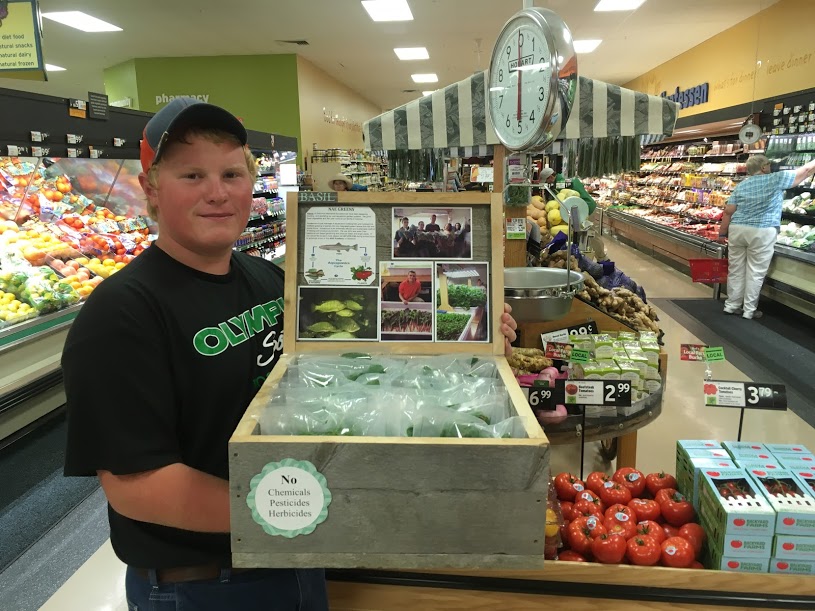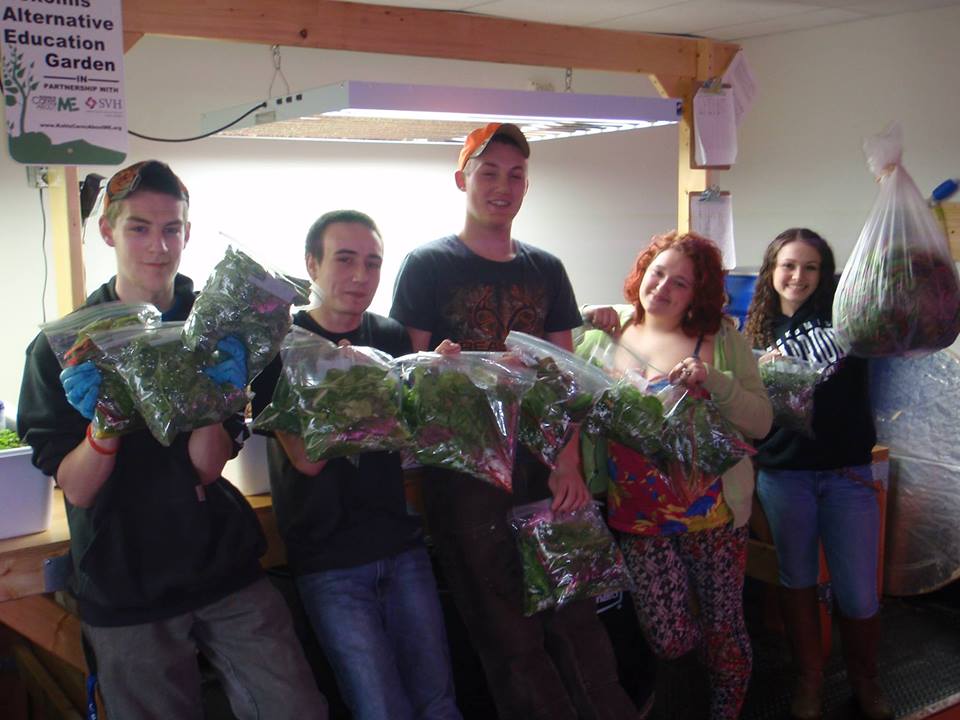
NAE Academy students Hunter and Zach harvest aquaponic sweet basil grown under induction lighting.
For the past two years NAE Academy (Nokomis Alternative Education) students have been designing, building, and operating their own Aquaponics systems. Aquaponics is the cultivation of fish and plants together in a recirculating system where fish waste provides a nutrient source for the plants and in turn the plants provide a natural filter for the fish. Aquaponics is an extremely efficient way to garden and uses 90% less water than soil based techniques. The efficiency of this system is multiplied when you considered the limited amount of space required to produce food crops when compared to traditional farming techniques on a unit per square foot basis.

Jake with aquaponic grow beds of kale, arugula, and cilantro.
This project has real implications for helping to address environmental degradation caused by our globalized food system. Consider, for instance, that the average distance food travels from farm to plate is now over 1500 miles! Those miles are traversed by planes, trucks and sometimes ships, which means tons of carbon and other climate altering substances emitted into our atmosphere. Also, the project at NAE Academy is very small and, though the students are constantly experimenting, the fish waste generated suggests that, on a slightly larger scale, we could be producing excess fertility that could be applied to school gardens throughout our district. This could further reduce the environmental costs of our food system, particularly as it relates to our school district’s lunch program by allowing student led garden projects to provide more fresh vegetables to students through the cafeteria.

Devon with a 10 lb. harvest of bright lights chard.
Along with the environmental benefits, current and potential, students have learned a myriad of both practical and academic skills. Students apply concepts in math, biology, chemistry and sustainable agriculture on a daily basis in order to create, operate and maintain these systems. During the design and building phases of the project students learned basic concepts in carpentry, plumbing and electrical work. Finally, students and their families have access to fresh and healthy produce on a daily basis. A favorite of students is to make juice smoothies by blending their fresh greens with fruit.

Hunter stocks NAE Academy’s basil box at Bud’s Shop ‘N Save in Newport.
Recently students have developed their own small business model growing and selling basil to Bud’s Shop N Save in Newport. Students harvest, package and deliver a pound of basil weekly to the store where they have a small display box. This has enabled the students to begin to generate their own revenue for the program. They hope to expand their systems soon so they can offer more basil and fresh herbs for sale.
The practical skills these students are learning will help them as they move beyond their educational years and out into the workforce. Many have expressed an interest in starting their own business. While some of the students came into the program with little or no interest in higher education, some are leaving with plans to pursue Associates or other degrees.

NAE students Damon, Brandon, Jake, Elaine, and Lily take home a harvest of mixed greens.
Thankfully these initial experiences have been made possible through private grant funding from Lowe’s, Sebasticook Valley Health, Kohls, The Perloff Family Foundation, and the Maine Community Foundation. The program has begun to show just how effective it can be at meeting the educational needs of the students that run it. It has also begun to open possible pathways which can further reduce environmental and economic costs for our school district (and others which might duplicate it). This is the type of educational experience, with its far reaching benefits, is proving itself well worth the investment.











Leave a Reply